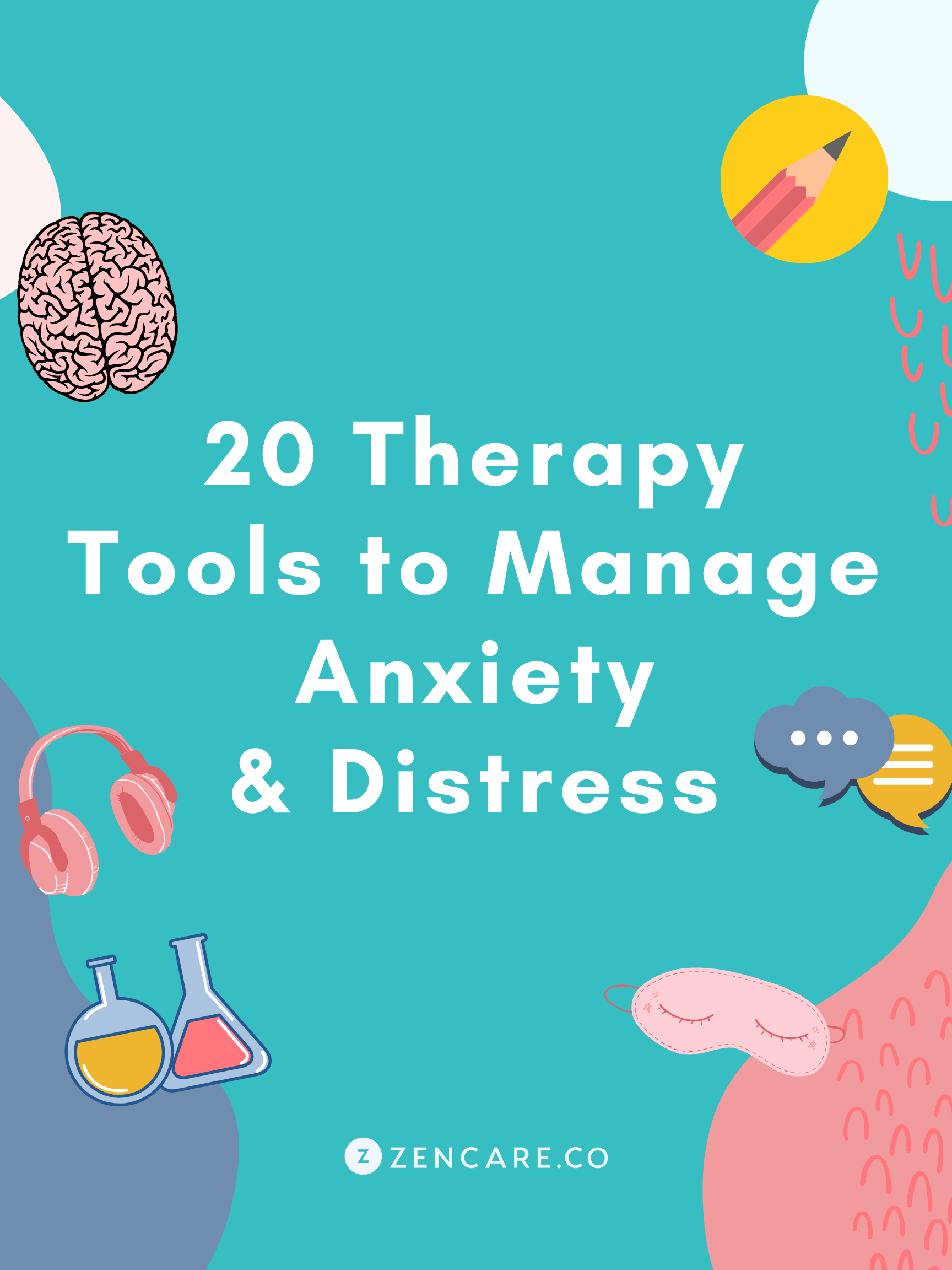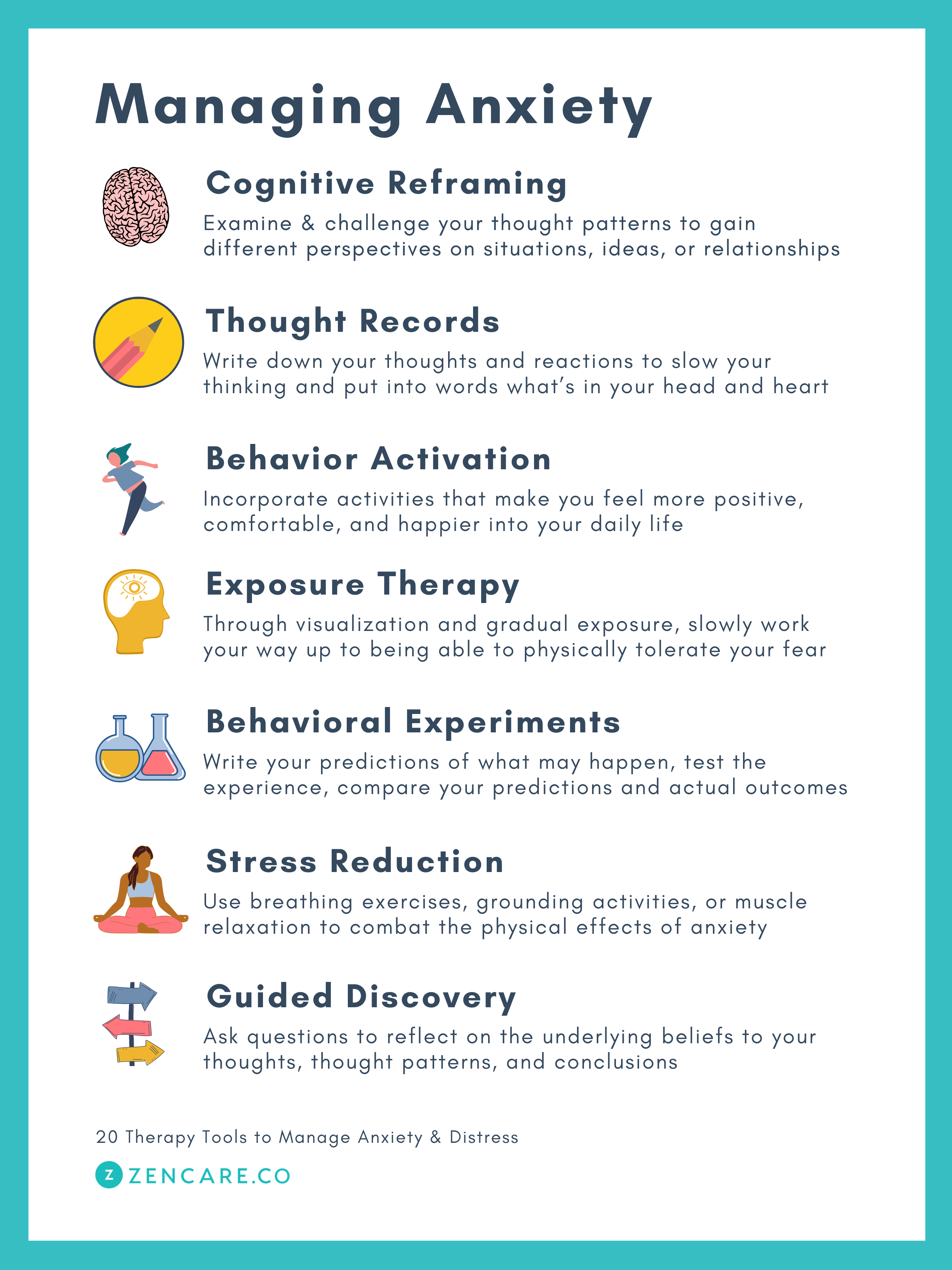Trusted counselling for anxiety disorder support by certified therapists
Trusted counselling for anxiety disorder support by certified therapists
Blog Article
Exploring Various Methods in Counselling for Stress And Anxiety Disorder for Long Lasting Modification
When tackling stress and anxiety disorders, it's necessary to explore a selection of therapy approaches. Each approach uses one-of-a-kind understandings and tools to help you handle your symptoms effectively. You may locate that incorporating techniques can yield the very best outcomes. Comprehending the nuances of these techniques is vital to cultivating enduring modification. What happens if the ideal combination could release a new degree of emotional wellness for you?
Comprehending Anxiety Conditions: A Quick Introduction
Stress and anxiety disorders, which impact numerous individuals worldwide, can substantially affect life. You could experience overwhelming feelings of concern or worry that appear irrepressible. These sensations can cause physical signs and symptoms like a racing heart, sweating, and even wooziness. Common kinds of stress and anxiety disorders consist of generalised anxiety disorder, panic attack, and social anxiety problem. Each has one-of-a-kind indications, yet they all share a tendency to disrupt your routine and relationships.Understanding the root creates of your stress and anxiety is essential. It could originate from genes, mind chemistry, or life experiences. Acknowledging your triggers can aid you handle your actions much better. It's essential to bear in mind that you're not the only one in this battle. Lots of people face similar difficulties, and seeking assistance is a solid step towards sensation better. By discovering stress and anxiety problems, you're currently on the course to understanding and handling your problem a lot more efficiently.
Cognitive-Behavioral Treatment: Challenging Negative Thought Patterns
In Cognitive-Behavioral Therapy, you'll begin by determining the negative thought causes that add to your stress and anxiety. When you recognize these thoughts, you'll work on replacing them with even more favorable alternatives. With each other, you'll develop reliable coping techniques to help handle your anxiety in daily situations.
Identifying Unfavorable Idea Triggers

When you encounter moments of distress, recognizing the certain triggers behind your adverse thoughts can be necessary in managing stress and anxiety. Start by paying interest to circumstances that provoke sensations of concern or anxiety. Is it a congested area, an upcoming due date, or a conversation with specific people? Write these instances in a journal. This will help you identify patterns in your reasoning. Notice physical feelings that accompany your unfavorable thoughts, like a racing heart or tightness in your breast. By determining these triggers, you gain understanding right into what's fueling your anxiousness. Recognizing these connections is the first step in testing those thoughts and ultimately restoring control over your psychological reactions.
Changing Thoughts With Positives
Challenging unfavorable thought patterns is an essential step in transforming your frame of mind and reducing stress and anxiety. You may commonly find yourself caught in cycles of insecurity or tragic thinking. As opposed to allowing these thoughts determine your feelings, method replacing them with positive affirmations or reasonable choices. When you think, "I can't handle this," shift it to, "I can take care of challenges one step at a time." This straightforward change can greatly impact your emotion. On a regular basis identifying and responding to these negative thoughts assists create a healthier interior dialogue. Bear in mind, it takes some time and initiative, however constantly practicing this strategy can result in long-term adjustment, encouraging you to encounter anxiety with renewed self-confidence and resilience.
Structure Coping Strategies With Each Other
Changing negative ideas is only the start of taking care of anxiety effectively. To develop lasting modification, you need to build coping strategies that equip you. Cognitive-Behavioral Treatment (CBT) aids you determine and challenge those unhelpful idea patterns. Together, you and your therapist can check out exactly how these ideas effect your feelings and behaviors.Start by developing functional techniques, like journaling or mindfulness exercises, that allow you to confront anxiety head-on. When you encounter your fears gradually, you'll learn to react differently.

Mindfulness and Acceptance-Based Approaches: Cultivating Present-Moment Understanding
As you browse the complexities of stress and anxiety, including mindfulness and acceptance-based methods can considerably improve your capacity to cultivate present-moment awareness. By concentrating on the right here and now, you'll find that you can observe your ideas and feelings without judgment (Counseling services for anxiety). This method assists you recognize your stress and anxiety without feeling overwhelmed by it.Engaging in mindfulness exercises, such as deep breathing, body scans, or led reflections, permits you to ground yourself in your current experience. Acceptance-based methods motivate you to welcome your emotions instead of combat against them. When you accept your sensations, they shed their power over you.Incorporating these techniques into your daily regimen can transform how you reply to anxiety. You'll create resilience and discover to browse demanding scenarios with higher convenience. Eventually, growing present-moment understanding lays the foundation for enduring modification, empowering you to lead an extra satisfying life
Direct Exposure Therapy: Facing Worries Gradually
Exposure treatment helps you face your concerns in a progressive means, making it less overwhelming. You'll find out strategies to encounter anxiety-provoking circumstances detailed, while likewise building coping techniques to manage your responses. This method empowers you to take control and decrease anxiousness in time.
Gradual Direct Exposure Methods

When facing anxiousness, slowly confronting your fears can be an effective way to regain control. This strategy, referred to as gradual exposure, includes slowly exposing yourself to the circumstances or items that trigger your stress and anxiety. Beginning with less daunting situations and progressively function your way up to even more difficult ones. If you're afraid of public speaking, you might start by speaking in front of a mirror, after that progress to sharing ideas with a buddy, and eventually deal with a little group. Each step aids desensitize you to the anxiety, building your confidence in time. Bear in mind, it's vital to speed here on your own and celebrate little victories as you relocate through this procedure, enhancing your capability to take care of anxiousness effectively.
Building Coping Techniques
Structure efficient coping approaches is vital for managing anxiousness, especially as you face your concerns gradually - Counseling services for anxiety. One effective technique is exposure therapy, where you begin by facing your anxieties in a controlled fashion. Start with much less frightening scenarios and slowly function your method as much as even more challenging circumstances. This gradual exposure helps desensitize you to anxiety sets off, making them much less overwhelming.Incorporate relaxation strategies, such as deep breathing or mindfulness, to soothe your mind during direct exposure. Track your progress, celebrating little success in the process to boost your confidence. Remember, it's fine to take your time; the goal isn't excellence yet steady renovation. By building these methods, you'll empower yourself to navigate anxiousness and accept life more completely
Psychodynamic Treatment: Uncovering Origin of Anxiousness
Psychodynamic therapy checks out the subconscious mind, revealing the root causes of your anxiousness. By examining your thoughts, sensations, and past experiences, this technique assists you uncover underlying conflicts and unsettled problems that might contribute to your existing anxiousness. You'll deal with a therapist to explore childhood years experiences, connections, and emotional patterns that form your feedbacks today.As you obtain understanding into these much deeper layers of your subconscious, you'll start to recognize how previous events affect your present habits. This understanding can result in catharsis, permitting you to process feelings you might have suppressed.Through the restorative connection, you can also determine defense devices that might have developed with time, using a more clear path to change. Inevitably, psychodynamic therapy outfits you with the devices to resolve your stress and anxiety at its core, promoting lasting transformation in your psychological well-being.
Holistic and integrative Techniques: Integrating Methods for Greater Efficacy
Integrating different therapeutic methods can improve your journey towards handling stress and anxiety extra effectively. By combining components from cognitive-behavioral treatment, mindfulness methods, and all natural techniques, you can develop a customized technique that addresses your unique demands. You might use cognitive-behavioral techniques to challenge negative idea patterns while integrating mindfulness workouts to ground on your own in the present moment.Additionally, discovering holistic techniques such as yoga exercise or meditation can advertise leisure and minimize anxiety signs. This mix enables you to establish greater self-awareness and resilience.Experimenting with these diverse methods can assist you find what reverberates most with you. Keep in mind, it has to do with locating a synergy that functions, instead of adhering to a solitary approach. This integrative method not only offers prompt alleviation however additionally fosters long-term abilities for managing anxiety, encouraging you to redeem control over your life.
The Role of Support Solutions: Building Strength With Connection
While it may appear that taking care of anxiety is a singular journey, having a strong assistance system can play a vital role in your resilience. Bordering yourself with compassionate close friends, family members, or support system produces a safe room where you can honestly share your feelings and experiences. When you attach with others, you remind on your own that you're not the only one in this struggle.These partnerships use encouragement and can supply practical coping techniques that have worked for others. It's additionally a chance to acquire viewpoint; friends can assist you see scenarios in different ways, decreasing feelings of isolation.Moreover, emotional support promotes a feeling of belonging, which can greatly alleviate anxiety symptoms. By leaning on your assistance system, you can build resilience and take on obstacles better. Keep in mind, connecting for aid suggests strength, and it can make all the distinction in your journey toward taking care of anxiousness.
Often Asked Inquiries
What Are the Common Signs And Symptoms of Stress And Anxiety Problems?
You could experience uneasyness, tiredness, problem focusing, irritability, muscle mass tension, and rest disruptions. Physical signs can consist of quick heartbeat, sweating, and shivering. Recognizing these indications early can assist you look for proper support and therapy.
The Length Of Time Does Treatment Generally Last for Anxiety Conditions?
Treatment for anxiousness problems normally lasts anywhere from a couple of weeks to several months. It truly depends on your private demands, progression, and the methods your specialist makes use of to assist you manage your anxiety properly.
Can Medication Be Used Along With Therapy for Anxiousness?
Yes, medicine can most definitely be made use of together with treatment for stress and anxiety. Integrating both strategies often improves treatment effectiveness, helping you take care of signs and symptoms while checking out underlying concerns through counseling (Counseling services for anxiety). Constantly consult your doctor for personalized guidance
Are There Self-Help Methods for Managing Anxiousness?
Yes, there are several self-help techniques for managing anxiousness. You can exercise mindfulness, take part in regular workout, preserve a balanced diet, establish a routine, and make use of deep breathing techniques to aid decrease stress and anxiety symptoms efficiently.
Exactly how Do I Know if I Need Professional Help for Anxiousness?

Report this page